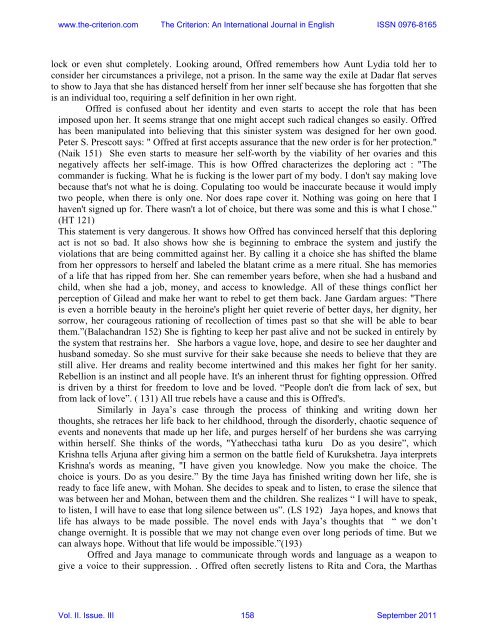Vol. II. Issue. III September 2011 - The Criterion: An International ...
Vol. II. Issue. III September 2011 - The Criterion: An International ...
Vol. II. Issue. III September 2011 - The Criterion: An International ...
Create successful ePaper yourself
Turn your PDF publications into a flip-book with our unique Google optimized e-Paper software.
www.the-criterion.com <strong>The</strong> <strong>Criterion</strong>: <strong>An</strong> <strong>International</strong> Journal in English ISSN 0976-8165<br />
lock or even shut completely. Looking around, Offred remembers how Aunt Lydia told her to<br />
consider her circumstances a privilege, not a prison. In the same way the exile at Dadar flat serves<br />
to show to Jaya that she has distanced herself from her inner self because she has forgotten that she<br />
is an individual too, requiring a self definition in her own right.<br />
Offred is confused about her identity and even starts to accept the role that has been<br />
imposed upon her. It seems strange that one might accept such radical changes so easily. Offred<br />
has been manipulated into believing that this sinister system was designed for her own good.<br />
Peter S. Prescott says: " Offred at first accepts assurance that the new order is for her protection."<br />
(Naik 151) She even starts to measure her self-worth by the viability of her ovaries and this<br />
negatively affects her self-image. This is how Offred characterizes the deploring act : "<strong>The</strong><br />
commander is fucking. What he is fucking is the lower part of my body. I don't say making love<br />
because that's not what he is doing. Copulating too would be inaccurate because it would imply<br />
two people, when there is only one. Nor does rape cover it. Nothing was going on here that<br />
I<br />
haven't signed up for. <strong>The</strong>re wasn't a lot of choice, but there was some and this is what I chose.”<br />
(HT 121)<br />
This statement is very dangerous. It shows how Offred has convinced herself that this deploring<br />
act is not so bad. It also shows how she is beginning to embrace the system and justify the<br />
violations that are being committed against her. By calling it a choice she has shifted the blame<br />
from her oppressors to herself and labeled the blatant crime as a mere ritual. She has memories<br />
of a life that has ripped from her. She can remember years before, when she had a husband and<br />
child, when she had a job, money, and access to knowledge. All of these things conflict her<br />
perception of Gilead and make her want to rebel to get them back. Jane Gardam argues: "<strong>The</strong>re<br />
is even a horrible beauty in the heroine's plight her quiet reverie of better days, her dignity, her<br />
sorrow, her courageous rationing of recollection of times past so that she will be able to bear<br />
them.”(Balachandran 152) She is fighting to keep her past alive and not be sucked in entirely by<br />
the system that restrains her. She harbors a vague love, hope, and desire to see her daughter and<br />
husband someday. So she must survive for their sake because she needs to believe that they are<br />
still alive. Her dreams and reality become intertwined and this makes her fight for her sanity.<br />
Rebellion is an instinct and all people have. It's an inherent thrust for fighting<br />
oppression. Offred<br />
is driven by a thirst for freedom to love and be loved. “People don't die from lack of sex, but<br />
from lack of love”. ( 131) All true rebels have a cause and this is Offred's.<br />
Similarly in Jaya’s case through the process of thinking and writing down her<br />
thoughts, she retraces her life back to her childhood, through the disorderly, chaotic sequence of<br />
events and nonevents that made up her life, and purges herself of her burdens she was carrying<br />
within herself. She thinks of the words, "Yathecchasi tatha kuru Do as you desire”, which<br />
Krishna tells Arjuna after giving him a sermon on the battle field of Kurukshetra. Jaya interprets<br />
Krishna's words as meaning, "I have given you knowledge. Now you make the choice. <strong>The</strong><br />
choice is yours. Do as you desire.” By the time Jaya has finished writing down her life, she is<br />
ready to face life anew, with Mohan. She decides to speak and to listen, to erase the silence that<br />
was between her and Mohan, between them and the children. She realizes “ I will have to speak,<br />
to listen, I will have to ease that long silence between us”. (LS 192) Jaya hopes, and knows that<br />
life has always to be made possible. <strong>The</strong> novel<br />
ends with Jaya’s thoughts that “ we don’t<br />
change overnight. It is possible that we may not change even over long periods of time. But we<br />
can always hope. Without that life would be impossible.”(193)<br />
Offred and Jaya manage to communicate through words and language as a weapon to<br />
give a voice to their suppression. . Offred often secretly listens to Rita and Cora, the Marthas<br />
<strong>Vol</strong>. <strong>II</strong>. <strong>Issue</strong>. <strong>II</strong>I 158 <strong>September</strong> <strong>2011</strong>
















